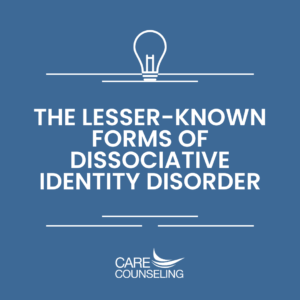The Lesser-Known Forms of Dissociative Identity Disorder
 Dissociative Identity Disorder (DID), formerly known as Multiple Personality Disorder, is a complex and often misunderstood condition. It is characterized by the presence of two or more distinct personality states, each with its own unique set of behaviors, memories, and identity. While DID is typically associated with these classic presentations, there are lesser-known and subtler forms of the disorder that may go unnoticed or undiagnosed.
Dissociative Identity Disorder (DID), formerly known as Multiple Personality Disorder, is a complex and often misunderstood condition. It is characterized by the presence of two or more distinct personality states, each with its own unique set of behaviors, memories, and identity. While DID is typically associated with these classic presentations, there are lesser-known and subtler forms of the disorder that may go unnoticed or undiagnosed.
- Covert Dissociative Identity Disorder
Covert DID is a less dramatic and more subtle form of the disorder. In this variant, individuals with DID do not display overt switches or distinct personalities. Instead, they experience a fragmentation of their identity, leading to a lack of continuity in their sense of self and memory. These individuals may not even be aware of their condition and might attribute their memory lapses and identity shifts to stress, forgetfulness, or other factors.
Covert DID can be challenging to diagnose because the symptoms are less obvious. It often goes unrecognized for years, and individuals may suffer in silence without understanding the source of their difficulties. Therapy and expert evaluation are essential for identifying and addressing covert DID.
- Functional Dissociative Identity Disorder
Functional DID is characterized by the presence of distinct personalities, but these personalities are highly functional and cooperative. Unlike the stereotypical portrayal of DID where personalities can be antagonistic or amnesic of one another, functional DID patients may have developed their distinct identities as a coping mechanism to manage various aspects of their lives.
For example, one identity may be responsible for work-related tasks, while another identity manages personal relationships. These identities collaborate and may even communicate with each other, resulting in a relatively seamless daily life. Functional DID can be challenging to identify because the level of distress or dysfunction is significantly lower than in other forms of the disorder. However, it can still lead to identity fragmentation and should be addressed through therapy.
- Dissociative Identity Disorder with Mood Disorders
While DID is often considered independently, it can co-occur with mood disorders such as depression or bipolar disorder. This combination can create a more complex clinical picture. Individuals with DID and comorbid mood disorders may experience mood swings and emotional dysregulation alongside the distinct personality states. Mood disturbances can impact the functioning of each identity and affect overall mental health.
The presence of mood disorders can complicate the diagnosis and treatment of DID, as managing mood symptoms is essential alongside addressing dissociation and identity issues. A comprehensive treatment plan is necessary to address the intertwined challenges.
- Anomic Dissociative Identity Disorder
Anomic DID is characterized by the presence of distinct identities, but these identities may lack personal memories or a clear sense of self. Individuals with anomic DID often struggle with significant memory loss, making it difficult to recall personal experiences or identify with a specific personality. The lack of a cohesive self-identity can lead to feelings of emptiness and confusion.
This form of DID can be distressing, as individuals may constantly question their identity and struggle with memory lapses. Anomic DID often requires extensive therapy to help individuals regain a sense of self and personal history.
- Latent Dissociative Identity Disorder
Latent DID refers to individuals who have not yet manifested distinct identities but exhibit symptoms and signs of identity fragmentation. These individuals may experience memory lapses, identity confusion, and a lack of continuity in their sense of self, yet they have not fully developed distinct personalities that take control of their behavior.
Identifying latent DID can be challenging, as individuals may not present the classic symptoms associated with the disorder. However, early intervention and therapeutic support can help prevent the condition from progressing into a more severe form of DID.
Dissociative Identity Disorder is a complex and multifaceted condition, with variations that may not fit the classic portrayal of the disorder. The lesser-known forms of DID, such as covert DID, functional DID, DID with mood disorders, anomic DID, and latent DID, present unique challenges and nuances that can make diagnosis and treatment more complex.
Understanding these lesser-known forms is essential for mental health professionals, as well as individuals who may be experiencing symptoms of DID.



























